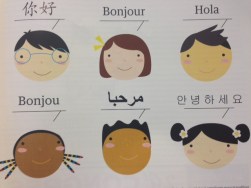By Sarah Clark, Principal of Divisional Programming
 Culturally and linguistically diverse schools offer new perspectives. Luckily, in Foothills School Division we have a linguistically diverse community of learners. Our students and families represent more than 20 different heritage languages! Heritage languages refer to the first language or home language spoken. Whether the language is Swahili, Tagalog, Spanish, German or Stoney, it is important to recognize and value the languages our students speak. Here are some ways we can value the Heritage Language of our students and children.
Culturally and linguistically diverse schools offer new perspectives. Luckily, in Foothills School Division we have a linguistically diverse community of learners. Our students and families represent more than 20 different heritage languages! Heritage languages refer to the first language or home language spoken. Whether the language is Swahili, Tagalog, Spanish, German or Stoney, it is important to recognize and value the languages our students speak. Here are some ways we can value the Heritage Language of our students and children.
Value Heritage Languages in the Family and Home Context:
Being multilingual is valuable. Although our linguistically diverse students are learning English, our goal is to ensure they learn English while honoring their first language. When they enter school as bilingual students we want our students to leave our schools continuing to be bilingual. Students who continue to speak their heritage language will also continue to communicate with parents and grandparents who speak that language. This family and cultural connection is important to the social-emotional well being of students.
 Sharing of Heritage Languages in the Classroom:
Sharing of Heritage Languages in the Classroom:
Encouraging the sharing of vocabulary or sayings of diverse languages represented in the classroom is a great way to highlight language diversity and recognize students’ heritage language as a strength. At right is an example of a dual language children’s book that offers both English and Tagalog text. Allowing multilingual students to read in English and Heritage Languages will help to develop literacy skills in both languages while honoring the students’ first language.
Parental Involvement:
Language skills like predicting, inference, reading context clues, etc. transfer from language to language. We can encourage parents of heritage languages to volunteer in our classrooms, provide stories in heritage languages, read or speak in heritage languages or even help students find word friends in the Heritage language and English (word friends are cognates — words that sound similar in both languages).
“Teachers can purposefully draw on their students’ first languages and thus reposition Culturally and Linguistically Diverse students as knowledgeable communicators” – Luigi Iannacci
Source Foothills School Division


